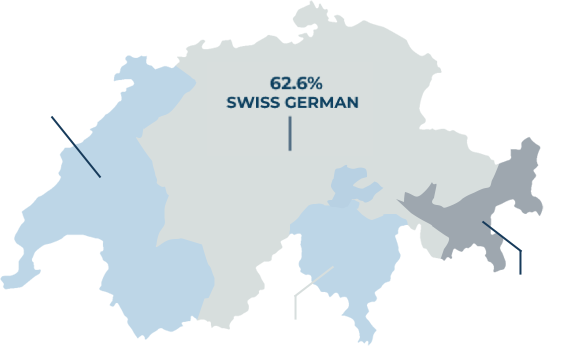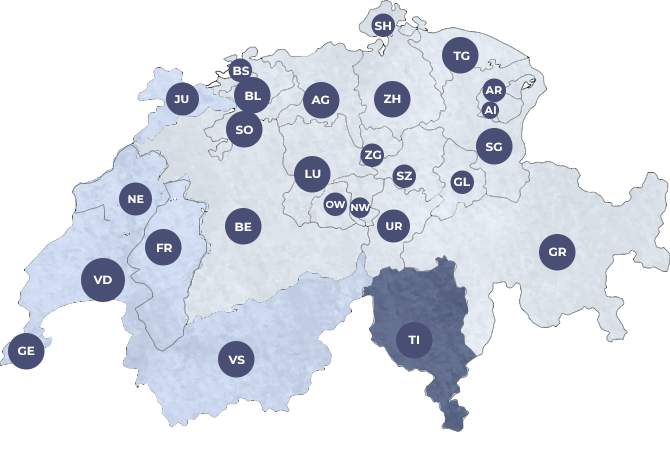Life in Switzerland – a brief overview
Are you planning to move to Switzerland or have you recently arrived in Switzerland? We are pleased to present our latest edition of the guide “Living & Working in Switzerland”. It is designed to give you an overview of some important topics that may be relevant to foreign nationals moving to Switzerland.
This guide is intended to provide practical information about the country as well as factual information about the most important aspects of individual taxation, social security, immigration and labor law. It is not intended to provide detailed answers to specific questions and is intended only as a general overview. Due to the complexity of the various laws and the constant changes in the legislation, none of the information contained in this brochure can be used as a basis for specific planning. However, we hope that this brochure will provide you with useful information and an initial guide to living and working in Switzerland and we would be happy to support you with our service after your move.
Four official languages
Unlike many other countries in Europe, where there is usually only one official national language, Switzerland has four of them: Swiss German, French, Italian and Romansh.

The most widespread language is Swiss German, which is spoken mainly in central Switzerland and the cantons bordering Germany.
French dominates in the western part of Switzerland, and Italian in the southern part.
Rhaeto-Romanic (Romansh) is spoken by only a very small part of the total population in southeastern Switzerland.
In each region, there are also different dialects in the various languages. Official documents are generally issued in German, French and Italian.
Currency and banking
The national currency in Switzerland is the Swiss franc (CHF).
1 Swiss franc (Franken) is equal to 100 centimes (Rappen).
The banknotes are available in the following amounts: 10, 20, 50, 100, 200, 1000.
For coins, there are the following denominations:
• CHF 1, 2, 5
• 5, 10, 20, 50 centimes
Current accounts can be opened at any major bank, Swiss Postbank, cantonal or private banks. The largest banks in Switzerland are: Credit Suisse, UBS and PostFinance.
Insider tip
Usually you can pay everywhere with any Debit/Credit Card (watch out, AmEx is not accepted at many places) or cash. Many farmers markets still only accept cash payments. One of the most popular mobile payment methods in Switzerland is the app TWINT. It allows users to connect their bank account or cards with the app to make secure payments (both for ecommerce and in person).
How to open a bank account in Switzerland as an expat
The simplest way to open a Swiss bank account is by visiting a bank in person. In general, accounts take from one week up to one month to become active. You won’t usually need to make an appointment to open a bank account. Any requested credit or debit cards can be expected to arrive after a week to 10 days.
Opening a Swiss bank account from abroad
It’s possible to open a bank account before you move to Switzerland, but this can be labor-intensive and time-consuming. Most national banks allow you to view their websites in English, making it easy to research your options as well as ask for an application pack. If you’re set on opening your account from abroad, you may find it easier to choose a bank that either has a branch in your home country or a relationship with one of your local providers. Banks will ask for more extensive documentation from overseas applicants. You must prove your identity by providing a passport and residency card (if applicable) and your address. You will also be asked to provide details about your personal and employment history. Any documents you provide will need to be authenticated, either by providing a notarized copy or Apostille stamp or by visiting a bank branch in person.

Public holidays
Public holidays apply throughout Switzerland. In addition, there are cantonal holidays, which may vary from canton to canton.Easter
New Years
Christmas
Swiss National Day
The federal public holidays are:
- January 1: New Year’s
- Day Good Friday (variable date)
- Easter Monday (variable date)
- Ascension Day (variable date, 38 days after Easter Monday)
- August 1: Swiss National Day
- December 25: Christmas Day
- December 26: Boxing Day
If a public holiday falls on a weekend day, the following Monday is not a day off.
Usual business and store opening hours
Government offices and banks are typically open from 8 a.m. to 5 p.m. on weekdays (Monday through Friday), although there may be differences depending on the office.
Stores are typically open from 8 a.m. to 5:30 p.m. on weekdays and 9 a.m. to 5 p.m. on Saturdays. In the cities, stores are often open even longer, some grocery stores even until 9 pm or later.
Stores, banks and government offices are generally closed on Sundays. Exceptions are stores in train stations, airports or tourist places.
Post office opening hours vary greatly by location. In addition to the large post offices, there are also some shop-in-shops, i.e. postal services in pharmacies, bookstores, kiosks, etc.
Insider tip
Get the Post app to track parcels or even organize pick@home service.
Electricity and water
The provision and maintenance of the public electricity and water network is the responsibility of the cantons. As a rule, anyone moving into a house or apartment must register their electricity connection with a supplier of their choice.
The monthly, quarterly or semi-annual contributions are then paid by means of a progress bill. The energy supplier, as well as the water company, usually prepare a statement at the end of the year, and refund overpaid contributions, or demand an additional payment in case of additional consumption.
Insider tip
Tap water is very good quality and drinkable throughout the whole country.
Telephone and television
There are three major mobile network operators in Switzerland: Swisscom, Sunrise and Salt. All three providers operate 2G, 3G, 4G and 5G networks. There are dozens of service providers who do not have their own network infrastructure or mobile communications license and therefore acquire network usage rights from a network operator. They then resell these to their customers with their own products and services. Examples are Wingo (Swisscom) or Yallo (Sunrise).
A (rather unpleasant) Swiss peculiarity is that every household has to pay a broadcasting fee – even if there is no TV or radio. The fees are collected by the SERAFE company.
A wide range of programs can be received via a satellite or cable connection. Watching TV via the Internet is of course gaining in popularity, as Swiss channels can also be received and the offer is constantly being improved.
A diverse population structure
Many ethnicities and cultures meet in Switzerland. Of the total population of 8.6 million, one in four is a foreigner. Italians, Germans and Portuguese make up the largest proportion of expatriate Swiss. However, the number of non-European immigrants is growing steadily.
Freedom of living
Switzerland is a predominantly Christian country, Catholics are the largest denomination, followed by Protestants. Switzerland’s religious landscape has changed considerably in the last few decades. The number of people with no religious affiliation has gone up, and there are also new communities that practice different faiths.

Equality
Women’s suffrage in Switzerland was introduced by a federal referendum in 1971, and in the canton of Appenzell Inerrhoden as late as 1990, making Switzerland one of the last European countries to grant full civil rights to its female population. In the meantime, however, there is also a large movement in Switzerland that is working for equality and recognition of women in the state and all areas of society.
In terms of LGBTQIA+ issues, the small country still has some catching up to do in international comparison. For example, the Swiss people did not approve “marriage for all” until September 2021. This means that same-sex couples are allowed to marry civilly only since July 2022; previously, only official recognition of the partnership was possible. Now they are equal to heterosexual married couples institutionally, but also legally. This applies, for example, to the facilitated naturalization of a foreign spouse or inheritance matters.
Excellent economy
Switzerland is one of the richest countries in the world. It has its solid economy to thank for that. The gross domestic product per capita is the equivalent of almost 76,000 US dollars (as of 2020). This puts Switzerland in second place, beaten only by Luxembourg in this category. The driving economic forces in Switzerland are the service sector, pharmaceuticals and watchmaking.

High standard of living
The robust economy enables people in Switzerland to enjoy a high standard of living. It is not for nothing that Zurich and Geneva are regularly voted to the top of the list when it comes to the question of the most livable cities in the world. But Switzerland is also a great place to live away from these two cities, as the strong influx into all regions over the past few years has proven time and again.

Exemplary social security system
The Swiss social security system is one of the best in the world. Through its underlying 3-pillar model , it enables an attractive retirement provision, so that the high quality of life can be maintained far beyond basic security, even at the end of employment. As a rule, every Swiss and everyone who lives and works in Switzerland must pay into this solidarity-based insurance system.
Healthcare system
The healthcare system in Switzerland is one of the best in the world. Even in less densely populated regions, the density of hospitals and doctors’ offices is high, so that medical care is always timely manner.
The federal government sets the financial framework within which health insurers may offer their premiums. The federal government must also give its prior consent to premium increases and can also reject them.
The cantons and municipalities are responsible for regulating hospitals. This means that it is determined at the cantonal level which hospital provides which services and how high the wages of doctors and nursing staff are.
Compulsory health insurance applies in Switzerland. This means that everyone who lives here must have health insurance. The health insurance companies are private companies, but they are only allowed to operate within the legal framework set by the federal government.
The companies are obliged to include every citizen in the so-called basic insurance- without a prior health check. Insured persons can add additional services that go beyond basic medical care to their health insurance plan at an additional cost, if they wish.
Every citizen is free to choose an insurer. The amount of the insurance premiums that are paid monthly differ in part very much from insurer to insurer. Therefore, it is advisable to compare the benefits and premiums of the individual insurers beforehand. You can take out the mandatory basic insurance and the voluntary supplementary insurance with different health insurance companies. So if you change your basic insurance, for example, you can still keep your supplementary insurance.
How to apply for health insurance
It is your responsibility to arrange your own Swiss health insurance. Foreigners can’t sign up for Swiss healthcare until they have arrived in Switzerland and applied for their Swiss residence permit or registered their residence with the local commune.
After arriving in Switzerland, you have 90 days to join a Swiss health insurance plan or apply for an exemption. It’s advisable to shop around and choose a provider that best suits your circumstances and preferences. You will usually have to provide proof of residence and details of your address to take out a policy.
Once you have registered with a Swiss heath insurance company, your coverage will backdate to the day you were liable for compulsory Swiss health insurance, for example, when you took up residency or gave birth in Switzerland. As you can claim expenses retrospectively, you must also pay the premiums from the beginning of your compulsory insurance period. Policies usually only include coverage for an individual and not additional family members, so spouses and children need to have separate coverage.
Choosing a health insurance provider
You can find details of authorized health insurance providers in Switzerland from your local cantonal authority. When choosing a provider, look at costs as well as what they cover and the claims process. You can check for things to consider in this short guide here.
If you wish to change Swiss health insurance companies, you can do so with three-month’s notice before the end of June or the end of December, providing you’re on a package where you pay the standard CHF 300 excess. Otherwise, you can only change your Swiss health insurer at the end of each calendar year, typically giving one month’s notice. The Swiss government website gives full information, including sample cancellation letters.



